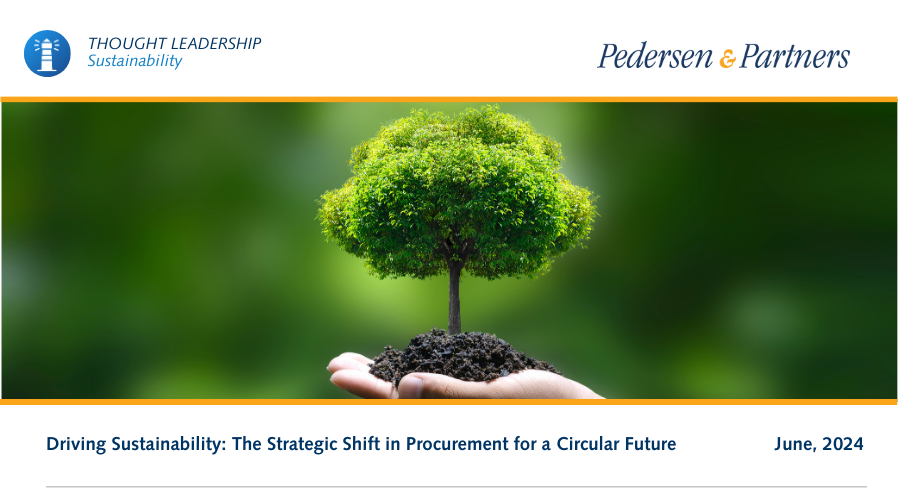Edition Focus: Artificial Intelligence & Games Industry
By Kristian Pedersen, Partner – Head of Global Consumer & Retail Practice, and Jan Großmann, Client Partner - Head of Consumer & Retail Practice Germany

The Games Industry
Could you please give us an overview of the development of the games industry?
The games industry has undergone a fascinating evolution, marked by significant advancements and transformative changes. Computer-based gaming began in the 1950s and 1960s when computer scientists and engineers started experimenting with simple interactive games on mainframe computers, laying the foundation for what was to come. The 1970s and 1980s saw the rise of the gaming arcade, with games such as Pong, Space Invaders, and Pac-Man captivating players worldwide and establishing the medium of computer games within the sphere of mainstream entertainment.
In the 1980s, home video game consoles such as the Atari 2600 and NES revolutionised the industry by bringing gaming home — right into the living room. The 1990s and early 2000s saw technological developments such as 3D graphics and improved processing power, and then online gaming allowed players to connect and compete globally. Finally, the introduction of smartphones led to the rise of mobile gaming.
In recent years, the games industry has witnessed the rise of esports and game streaming platforms such as Twitch and YouTube Gaming. Virtual Reality (VR) and Augmented Reality (AR) technologies have made significant contributions to the industry, offering immersive and interactive experiences.
The games industry has grown into a global USD 200 billion industry, shaped and driven by technology, expanding audiences, and innovative game design. The future of gaming continues to hold exciting prospects, continually refined and revitalised by emerging technologies.
How have the games industry’s business models, channels, and monetisation changed over the years?
The business models, distribution channels, and monetisation strategies of the games industry have evolved significantly over several decades. Initially, games were sold through brick-and-mortar retail stores, with consumers purchasing cartridges or discs for specific platforms. However, the internet has facilitated the use of digital distribution platforms such as Steam, enabling gamers to directly purchase and download games to their computers, and eliminating the need for physical copies.
The emergence of free-to-play (F2P) games led to a new monetisation model, where games are initially free but offer in-game purchases for additional content or upgrades. This model has become increasingly popular, particularly in mobile gaming. Subscription services such as Xbox Game Pass, PlayStation Plus, and Apple Arcade have also gained traction, offering players access to a library of games for a monthly fee, and reducing the need for individual purchases.
Mobile gaming has given rise to several monetisation strategies, including “freemium” games that combine free content with premium features available for purchase. Additionally, in-game purchases have become common, especially in F2P games, allowing players to buy cosmetic items, character upgrades, or additional levels. AI may be used to market in-game purchases, taking into account an individual user’s gameplay skills and purchase behaviour.
At the same time, crowdfunding platforms have enabled game developers to secure up-front funding directly from players, allowing them to create games based on audience support, often providing incentives such as exclusive rewards and early access.
The rise of esports and game streaming has opened up new monetisation opportunities. Esports generate revenue through sponsorship, advertising, ticket sales, and media rights, while game streaming platforms like Twitch and YouTube Gaming offer options for content creators to monetise their channels through subscriptions, donations, and sponsorships.
These changes in business models, distribution channels, and monetisation strategies reflect the industry’s evolution in response to technological advancements, player preferences, and market demands.
What are the main trends in the games industry?
The games industry is shaped by several key trends, summarised below:
- AI-based monetisation with deep learning (including predictive analytics) is one of the most challenging and interesting trends right now.
- Mobile gaming dominates the industry, with an increasing majority of players accessing games mainly or wholly on smartphones and tablets.
- Esports and competitive gaming attract large audiences and generate substantial revenue, leading to the development of dedicated teams and leagues.
- Virtual Reality (VR) and Augmented Reality (AR) technologies offer immersive experiences, while cross-platform play and cloud gaming enhance inclusivity and accessibility.
- Streaming platforms such as Twitch and YouTube Gaming create new entertainment and community-building opportunities.
- Live service games prioritise player engagement through continuous updates and interactions.
- Social gaming and user-generated content thrive, fostering multiplayer interactions and creative collaboration.
- The industry is also starting to focus on sustainability and ethical considerations: reducing carbon footprints, promoting diversity, ensuring fair treatment, and the like.
These trends reflect technological advancements, changing consumer behaviours, and a growing emphasis on community, accessibility, and social engagement.
Digital Business Transformation in FMCG/Retail
How do you see the situation and status of digital transformation in FMCG/Retail?
The digital transformation in the FMCG and retail sectors has already had a profound impact on the industry, and continues to evolve rapidly. The rise of e-commerce has revolutionised the way consumers shop for FMCG products. Online shopping platforms and marketplaces have become popular avenues for convenient purchases, enabling retailers to expand their customer base and provide personalised shopping experiences. Additionally, this shift has streamlined supply chain processes, leading to greater efficiency.
Another significant trend is the adoption of omnichannel retailing strategies. Integrating online and offline channels has become essential for FMCG/retail businesses. Omnichannel approaches enable customers to seamlessly transition between different touchpoints: physical stores, websites, mobile apps, and social media. This integration enhances the overall customer experience and allows retailers to gain a comprehensive understanding of the customers and their shopping behaviour.
The increased availability of customer data has been paired with advancements in analytics to turbocharge the use of data analytics and personalisation in FMCG/retail. By leveraging customer data, retailers can better understand consumer preferences, optimise product assortments, and deliver personalised recommendations. This leads to improved customer satisfaction, and enables targeted marketing campaigns.
Mobile apps have become indispensable tools for FMCG/retail businesses, providing features such as loyalty programs, mobile payments, personalised offers, and easy product discovery. These apps enhance customer engagement and deliver a seamless shopping experience.
Digital transformation has also had a significant influence on supply chain operations, leading to optimisation and improved transparency. Technologies such as RFID, IoT, and blockchain enable real-time inventory tracking, demand forecasting, and supply chain visibility. This has resulted in reduced costs, minimised stockouts, and optimised logistics.
Artificial Intelligence (AI) and automation are making their mark in the FMCG/retail industry. AI-powered chatbots and virtual assistants offer efficient customer support, while automated fulfilment systems enhance order processing and delivery. AI algorithms play a crucial role in demand forecasting, pricing optimisation, and inventory management.
Social media platforms have become vital for FMCG/retail businesses to engage with customers. Brands use social media to connect with their audience, build communities, and receive direct feedback. Influencer marketing has gained prominence, allowing brands to reach a wider audience and enhance brand awareness.
Although digital transformation brings numerous opportunities for growth and improved customer experiences, there are challenges to overcome. Privacy and data security concerns, competition from e-commerce giants, and the need for infrastructure upgrades pose challenges for traditional retailers. However, embracing digital technologies enables FMCG/retail businesses to thrive by capitalising on the opportunities presented.
Digital transformation is reshaping the FMCG/retail industry by enhancing customer experiences, optimising operations, and driving growth. To succeed in the digital era, businesses must stay agile, embrace innovative strategies, and continuously adapt to the evolving landscape of digital technologies.
What are the digital transformation focus areas in FMCG/Retail?
The main focus areas are:
- e-commerce and online presence
- customer experience enhancement
- supply chain optimisation
- data analytics and business intelligence
- mobile and digital engagement
- integration of physical and digital channels
- innovation with emerging technologies
- sustainability considerations.
Retailers are investing in robust e-commerce platforms, personalised customer experiences, supply chain process optimisation, and harnessing data analytics for informed decision-making. They are also enhancing mobile and digital engagement through mobile apps and omnichannel strategies. Integration of physical and digital channels, as well as the adoption of emerging technologies like VR, AR, AI, and automation, are key focus areas. Sustainability practices and ethical considerations are gaining importance in digital transformation. These focus areas drive innovation, improve operational efficiency, and ensure competitiveness in the evolving FMCG/Retail landscape.
To what extent will AI be a game changer in FMCG/Retail?
AI has the potential to revolutionise the FMCG/Retail industry by impacting areas such as customer experience, operations, supply chain, and marketing. It could provide a competitive edge, improve operational efficiency, and enhance the customer experience. Successful AI implementation requires proper data management, skilled resources, and a strategic approach; it should be used as a tool to augment human capabilities rather than replacing them entirely.
Possible use cases for AI in FMCG/Retail include:
- Personalised recommendations
- Accurate demand forecasting
- Automated customer support through chatbots and virtual assistants
- Pricing optimisation
- Fraud detection
- Supply chain optimisation
- Enhanced marketing campaigns
Executive Profiles
What is the impact of AI developments on the ideal profile of future leaders?
The increased use of AI has a significant impact on the ideal profile of future leaders, who will need to demonstrate a complex skillset:
- Technical proficiency, including data-driven decision-making skills;
- Adaptability and commitment to continuous learning;
- High ethical standards, as leaders navigate privacy, bias, and transparency issues;
- Collaboration and interdisciplinary skills, especially when working with diverse teams;
- Strategic vision and innovation to integrate AI into the overall business strategy;
- Finally, emotional intelligence and leadership skills are needed to foster a culture that values human abilities alongside AI.
Future leaders must embody these qualities to effectively leverage AI and navigate the evolving technological landscape.
What kind of personalities are needed to lead teams through a transformation process?
Leaders who can successfully lead teams through a transformation process possess key personality traits; they must be visionary, resilient, empathetic, collaborative, agile, adaptable, open-minded, influential, and continuous learners. These leaders have a clear vision, are able to handle setbacks, understand and support their team, foster collaboration, navigate ambiguity, embrace new ideas, influence stakeholders, and prioritise personal growth.
By embodying these qualities, leaders create an environment conducive to innovation, resilience, and collaboration during times of change.
Talent Sourcing
What are the key leadership roles for a successful digital business transformation?
Key leadership roles for a successful digital business transformation:
- the visionary leader who sets the direction
- the change champion who drives cultural change
- the digital strategist who develops a comprehensive roadmap
- the collaborative facilitator who promotes cross-functional collaboration
- the technology advocate who champions new technologies
- the data-driven decision maker who emphasises data-driven insights
- the talent developer who invests in upskilling
- the customer experience advocate who prioritises customer needs
These are complementary roles; they work together to lead the organisation through transformation, fostering innovation and driving growth.
How relevant are the skills and expertise of games industry leaders in other sectors?
Leaders from the games industry are known for their innovation, creativity, and customer-centric approach. They have a deep understanding of technology, digital platforms, and data analytics, and they excel in team management, collaboration, and fostering an agile and adaptive mindset. Although they may need to acquire and get up to speed on industry-specific knowledge, their skills bring fresh perspectives and innovative thinking to drive success and growth in other sectors.
In which business areas could games industry executives add the most value?
Games industry executives have the potential to contribute their unique skills, experiences, and perspectives to drive innovation and success in various business areas across many different industries:
- Expertise in enhancing customer experiences through gamification, interactive interfaces, and user-centred design;
- Experience in guiding the implementation of digital initiatives such as e-commerce integration and data-driven decision-making to facilitate digital transformation;
- Proficiency in using data analytics to gain valuable insights into customer behaviour and preferences, fostering innovation and creativity through fresh ideas and a culture of innovation;
- Familiarity with the challenges and rewards of leading diverse teams, promoting agile methodologies, and fostering collaboration;
- New insights into alternative revenue streams and innovative business models for monetisation;
- Understanding of branding: leveraging digital marketing, influencer partnerships, and social media engagement for effective branding strategies.










 I am excited to join the firm and I look forward to providing strategic leadership advice and detailed talent market analysis to global, regional, and local clients who value the robust service we are offering. Pedersen & Partners is continuing its growth momentum and I trust that my combination of business operations and executive recruitment expertise will help expand the Pedersen & Partners brand into an even greater array of markets,” added Michael Larsen, Client Partner at Pedersen & Partners.
I am excited to join the firm and I look forward to providing strategic leadership advice and detailed talent market analysis to global, regional, and local clients who value the robust service we are offering. Pedersen & Partners is continuing its growth momentum and I trust that my combination of business operations and executive recruitment expertise will help expand the Pedersen & Partners brand into an even greater array of markets,” added Michael Larsen, Client Partner at Pedersen & Partners.


